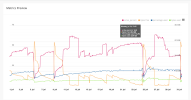- Server operating system version
- OS: CentOS Linux 7.9.2009 (Core)
- Plesk version and microupdate number
- Plesk Obsidian Version 18.0.50 Update #2, last updated on Feb 27, 2023 02:02 AM
All I know, when my client tells me they have an "odd" problem, I go and "resave" the PHP setting tab.
OR I might need to toggle the PHP value (pick different one. save. put it back. save)
Has anyone else done this as their "solution" to some strange problem with FPM-PHP?
I really, really wish I knew how to spot or test or know when I need to do this, vs. waiting on my client to tell me they have a problem.
OR it would awesome to prevent this from happening. Less stressful too!
thanks
OR I might need to toggle the PHP value (pick different one. save. put it back. save)
Has anyone else done this as their "solution" to some strange problem with FPM-PHP?
I really, really wish I knew how to spot or test or know when I need to do this, vs. waiting on my client to tell me they have a problem.
OR it would awesome to prevent this from happening. Less stressful too!
thanks


